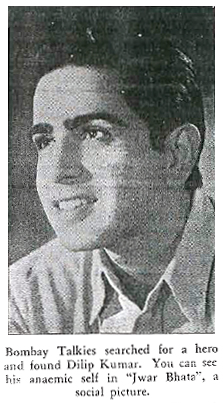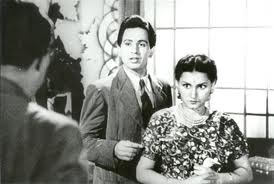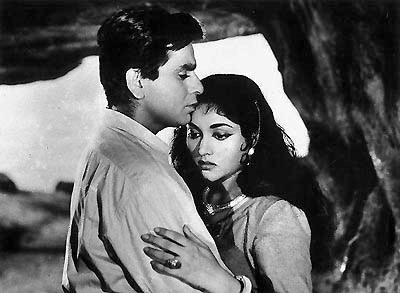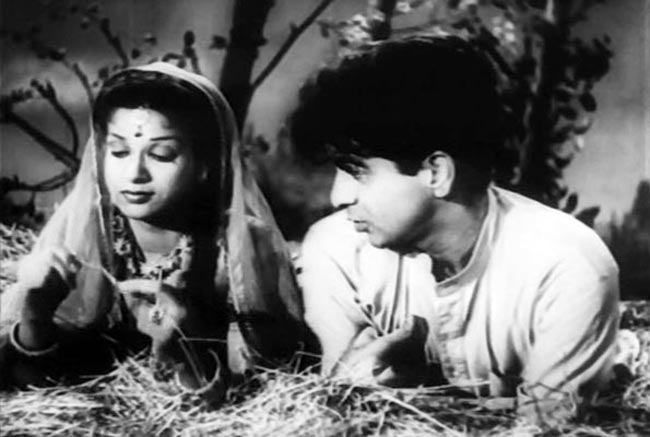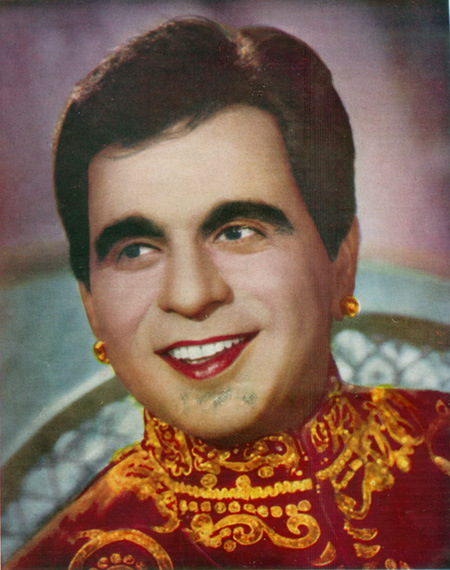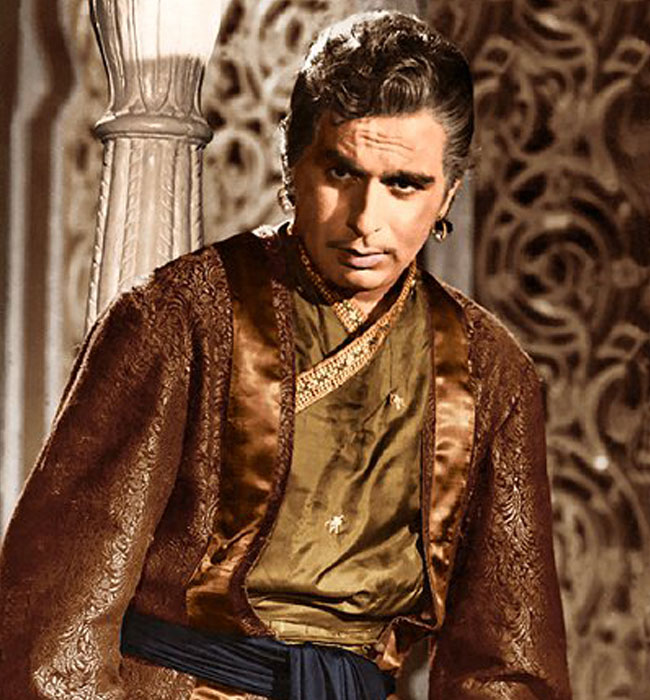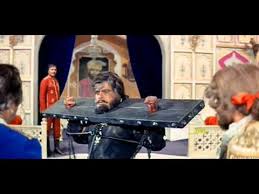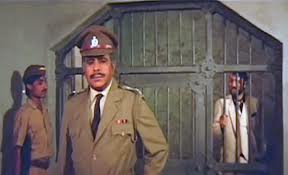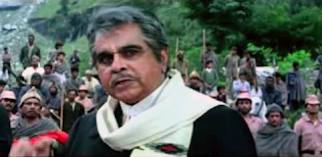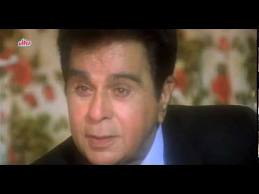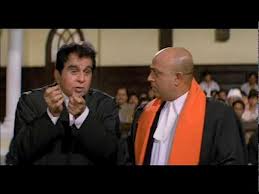Dilip Kumar: his films, their box office performance, awards, career
(→His third coming) |
|||
| Line 100: | Line 100: | ||
===His third coming=== | ===His third coming=== | ||
| − | When Dilip Kumar came back to the silver screen after five years in Kranti (1980) it was his second innings but a successful one too. Stories were written by contemplating him in a central role. Thus we have Shakti and Vidhata (1982), Mazdoor (1983), Duniya and Mashal (both 1984), Karma and Dharam Adhikari (Both 1986), and Kanoon Apna Apna (1989), Izzatdaar (1990)) and Saudagar (1991) and Qila (1998). In Shakti Dilip Kumar had Amitabh Bachchan, the super-star of the time, pitted against him. However Dilip Kumar came out with such a brilliant performance that it won him yet another Filmfare Award in the Best Actor category. He was also nominated for the said Award in Mashal and Saudagar. Dilip Kumar's performance in Mashal was again a trend-setter and his AY BHAI....scene has been emulated in many Bollywood movies. | + | When Dilip Kumar came back to the silver screen after five years in Kranti (1980) it was his second innings but a successful one too. Stories were written by contemplating him in a central role. Thus we have Shakti and Vidhata (1982), Mazdoor (1983), Duniya and Mashal (both 1984), Karma and Dharam Adhikari (Both 1986), and Kanoon Apna Apna (1989), Izzatdaar (1990)) and Saudagar (1991) and Qila (1998). In Shakti Dilip Kumar had Amitabh Bachchan, the super-star of the time, pitted against him. However Dilip Kumar came out with such a brilliant performance that it won him yet another Filmfare Award in the Best Actor category. He was also nominated for the said Award in Mashal and Saudagar. |
| + | |||
| + | '''Ai Bhai!''' Dilip Kumar's performance in Mashal was again a trend-setter and his AY BHAI....scene has been emulated in many Bollywood movies. In Yash Chopra's Mashaal (1984), there is a heart-wrenching scene in which Dilip Kumar's character is shown standing on a road desperately looking for some help to take his very ill wife (Waheeda Rehman) to a hospital. But she dies in his arms, no vehicle willing to stop on the quiet night street. Dilip Kumar says the scene was a straight replay of his father's panic when his mother had a near fatal asthma attack. | ||
| + | |||
In the 1970s, 1980s and 1990s he worked in relatively few films. However, such was the respect and fan following that he continued to enjoy that most of the films that he acted in in his 60s were major hits: '''Krânti ''' (1981), '''Vidhâtâ '''(1982), '''Karmâ ''' (1986). | In the 1970s, 1980s and 1990s he worked in relatively few films. However, such was the respect and fan following that he continued to enjoy that most of the films that he acted in in his 60s were major hits: '''Krânti ''' (1981), '''Vidhâtâ '''(1982), '''Karmâ ''' (1986). | ||
'''Duniyâ ''' (The world; 1984), ''' Izzatdâr ''' (The respectable one) (1990) and ''' Saudâgar ''' (Merchant) (1991) were big-budget films, if not as successful. His last film was ''' Qilâ ''' ("Castle"/ 1998). | '''Duniyâ ''' (The world; 1984), ''' Izzatdâr ''' (The respectable one) (1990) and ''' Saudâgar ''' (Merchant) (1991) were big-budget films, if not as successful. His last film was ''' Qilâ ''' ("Castle"/ 1998). | ||
| + | |||
===2014: His last film to be released: Aag ka dariya=== | ===2014: His last film to be released: Aag ka dariya=== | ||
''' Dilip Kumar-starrer 1990 film set to hit theatres soon ''' | ''' Dilip Kumar-starrer 1990 film set to hit theatres soon ''' | ||
Revision as of 20:47, 1 June 2014
This article is under construction: and you can help The portions originally meant for this article have been shifted to Madhubala, actress If you wish to contribute photographs and/ or biographical details about Dilip Kumar (or any other subject), please email them to parvezdewan(a)yahoo.com |
Contents |
The sources of this article include
i) The real superstars of Bollywood - Dilip Kumar Jagran Junction 30 Aug, 2011
ii) Nasir’s Eclectic Blog Tuesday, December 1, 2009
iii) Nasir’s Eclectic Blog Tuesday, December 1, 2009
iv) Excerpted from `Dilip Kumar: The Substance and the Shadow' with permissions [obtained by The Times of India] from Hay House India and Penguin Books India The Times of India Jun 01 2014
'Masti Maalgadi'/ Jagran Junction writes:
If Big B Amitabh Bachchan is considered the superstar of Hindi films of the last quarter of the 20th century, this superstar of the Hindi films of the 1950s and 60s was Dilip Kumar.
Profile

Dilip Kumar was born on December 11, 1922 in the city of Peshawar in present-day Pakistan. His childhood name was Mohammad Yousuf Khan (Muhammad Yusuf Khan). His father, Lala Ghulam Sarwar's (Lala Ghulam Sarwar) used to sell fruit to feed his family.
Early life
His family migrated to Bombay during the Partition of India. He passed his early life in misery. The losses in the trade of his father made Dilip begin to work in a canteen in Pune. That was where Devika Rani first sighted him, and it was from there that she made an actor of Dilip Kumar. Dilip Kumar was the new name that he assumed.
At the age of twenty-five years Dilip Kumar had become the country's number one actor.
Career
1942-47
Dilip Kumar began his film career with the film Jwâr Bhâtâ ("Tides"); however, the film was not successful. His first hit was "Fireflies" ( Jugnu ). The film was released in 1947 and placed Dilip Kumar in the category of Filmistan’s successful film-stars.
In 1942, Yusuf Khan (Dilip Kumar) was in jail overnight, he refused to have his breakfast of eggs, toast and tea that was offered to him the next morning because that day Mahatma Gandhi was on n fast. The nation was busy with the Quit India Movement of 1942, for driving out the British Raj. During the next two years life was to take unexpected turn for Yusuf Khan when Devika Rani, the lady boss of Bombay Talkies, offered him a contract to act in her films.
After initial hiccups Yusuf Khan accepted the offer and thus landed a role in Jwar Bhata (1944) under the name that the First Lady of the Indian Screen selected for him – Dilip Kumar - the name that was to cast spell on generations of film goers and fraternity for the next six decades. Thus he made his debut as an actor opposite Mridula and Shamim under the direction of Amiya Chakarborty. Dilip Kumar did two more films, Pratima (1945) and Milan (1946) after Jwar Bhata.
1947-53
In 1949, Dilip Kumar and Raj Kapoor, the other rising superstar of the era, worked together with for the first time in the film Andâz . The film was a hit. Serious roles in films such as Deedâr (1951) and Devdas (1955) earned him the title King of Tragedy.
Jugnu (1947), Ghar Ki Izzat, Mela, Shaheed, Anokha Pyaar and Nadiya Ke Paar (all 1948); Shabnam and Andaz (1949); Jogan, Babul and Arzoo (all 1950); Hulchal, Tarana and Deedar in 1951; Aan, Sangdil, and Daag (1952).
Daag which was inspired by the 1950 Marathi movie, Mee Daaru Sodli, won for Dilip Kumar his first Filmfare Award in 1953 for his stellar performance of an alcoholic who having set out to purchase medicines for his dying mother, instead succumbs to his temptation and buys liquor for himself, and who finally manages to give up his drinking habits for good. In 1953, Dilip Kumar featured in Shikast and his favourite Foot-Path “where stark reality was mingled with thought-provoking romanticism.”
1954-59
Around 1954, Bimal Roy was busy shooting with Dilip Kumar his prestigious Devdas which was based on the Bengali novel of Sharatchandra Chattopadhyay.
In 1954, Mehboob Khan released his Amar, starring Dilip Kumar, Madhubala and Nimmi. From 1955 till 1959 Dilip Kumar starred in such movies as Devdas and Udan Khatola, (1955); Insaniyat, and Azaad (1956); Naya Daur and Musafir (1957), Madhumati and Yahudi (both Bimal Roy’s – 1958). During these years, Dilip Kumar won the Filmfare Best Actor Awards for his roles in Devdas, Azaad and Naya Daur! He also got the nomination for the said Award in Madhumati. Dilip Kumar did Paigham (1959) along with Raj Kumar, Vyjayantimala and B. Saroja Devi. He was cited for the Filmfare Best Actor Award nomination.
1960-69
Dilip Kumar, in 1960 he had two releases: Kohinoor and Mughal-e-Azam. He again won the Filmfare Best Actor Award for Kohinoor.
In the all-time blockbuster Mughal-e-Azam (1960), he played the role of the Mughal prince Jahangir.
In 1961 he wrote and produced and acted in Ganga Jamuna which was a trend-setting movie in many respect. This mile-stone of a movie elicited a very powerful performance from Dilip Kumar.
Sophia Loren, the two times Oscar Winner, was influenced profoundly by his acting. Astonishingly, Dilip Kumar did not win the Filmfare Award. He was of course nominated under that category.
After a three-year hiatus, Dilip Kumar accepted the role of Leader (1964) for Sashadhar Mukherjee. He also wrote the film-story which is as relevant today as it was then. His comedy role fetched him another Filmfare Award in the Best Actor Category.
His second coming
Dilip Kumar played a double role in Ram aur Shyam. The film was a superhit after a lean period that saw Leader and Dil diya dard liya flop.
His movies in the second half of the Sixties are: Dil Diya Dard Liya (1966); Ram Aur Shyam (1967), Sungharsh, and Aadmi (both 1968).
He was nominated in the Best Actor Category in all the four films. In Ram Aur Shyam Dilip Kumar played the full-fledged double role for the first time and his impact in the movie was such that it won many acclaims, including the prestigious Filmfare Award for his diverse, sensitive and powerful performance. His adverse critics, who thought he was finished, were deservingly dealt a serious blow.
However, his next few films, notably the critically acclaimed Sunghursh and Dastân did not do well either.
The 1970s
In Nineteen Seventies we have four Dilip Kumar movies: Gopi (1970), Dastaan (1972), Sagina (1974) and Bairaag (1976). All the three movies, excluding Dastaan, had his better-half, Saira Banu, as his heroine, while B.R. Chopra’s Dastaan which was a remake of Afsaana (1951) had Sharmila Tagore. In the Seventies he also had a guest appearance Phir Kab Milogi (1974) – a Mala Sinha-Biswajeet starrer.
Sagina Mahato (1970) was his diamond-jubilee hit Bengali film which was directed by Tapan Sinha. It created box-office records in Bengal.
Anokha Milan (1972) had Dharmendra along with him.
In Bairaag, Dilip Kumar had triple roles, that of a father and his two sons. Bairaag additionally had the beautiful Leena Chandavarkar also as his heroine. This was the last movie of Dilip Kumar where he was the romantic hero. Thus from 1944 to 1976 he played the roles of a film hero for 32 long years.
The 1980s and ’90s
His third coming
When Dilip Kumar came back to the silver screen after five years in Kranti (1980) it was his second innings but a successful one too. Stories were written by contemplating him in a central role. Thus we have Shakti and Vidhata (1982), Mazdoor (1983), Duniya and Mashal (both 1984), Karma and Dharam Adhikari (Both 1986), and Kanoon Apna Apna (1989), Izzatdaar (1990)) and Saudagar (1991) and Qila (1998). In Shakti Dilip Kumar had Amitabh Bachchan, the super-star of the time, pitted against him. However Dilip Kumar came out with such a brilliant performance that it won him yet another Filmfare Award in the Best Actor category. He was also nominated for the said Award in Mashal and Saudagar.
Ai Bhai! Dilip Kumar's performance in Mashal was again a trend-setter and his AY BHAI....scene has been emulated in many Bollywood movies. In Yash Chopra's Mashaal (1984), there is a heart-wrenching scene in which Dilip Kumar's character is shown standing on a road desperately looking for some help to take his very ill wife (Waheeda Rehman) to a hospital. But she dies in his arms, no vehicle willing to stop on the quiet night street. Dilip Kumar says the scene was a straight replay of his father's panic when his mother had a near fatal asthma attack.
In the 1970s, 1980s and 1990s he worked in relatively few films. However, such was the respect and fan following that he continued to enjoy that most of the films that he acted in in his 60s were major hits: Krânti (1981), Vidhâtâ (1982), Karmâ (1986).
Duniyâ (The world; 1984), Izzatdâr (The respectable one) (1990) and Saudâgar (Merchant) (1991) were big-budget films, if not as successful. His last film was Qilâ ("Castle"/ 1998).
2014: His last film to be released: Aag ka dariya
Dilip Kumar-starrer 1990 film set to hit theatres soon
ANI | Dec 25, 2013
'Aag Ka Dariya,' made in 1990, might finally be released in 2014. It also stars actress Rekha. In thew film he plays a father in search of his missing daughter.
The director of the film, VS Rajender Babu, told BBC that the film did not get released initially because of a financial dispute and the original print of the film was badly damaged in the intervening years.
But in 2013 Babu found a "perfect print" of the film with a distributor in Singapore.
Other unreleased films
Films starring Dilip Kumar that never got exhibited include: Chanakya, Kalinga, Raasta and Shikasta.
Iconic roles that Kumar refused
UpperStall writes:
Dilip Kumar refused Guru Dutt's Pyaasa (1957) feeling that the character of the poet Vijay in the film was just an extension of his role in Devdas. He also turned down 20th Century Fox's offer of The Rains Came and David Lean's offer of the role which ultimately went to Omar Sharif in Lawrence of Arabia (1962) and which made a major Hollywood star out of Omar Sharif. To quote Dilip Kumar,
"In your own bazaar you enjoy a certain status. What's the point of venturing out into fields unknown where you have no say? No contact with the subject matter."
Quality, not quantity
In spite of being the highest paid and most successful star of the 1950s and early ’60s, Dilip Kumar acted in just 54 films. This indicated that he wanted to give only high quality performances.
In the 1950s and ’60s, Filmistan was ruled by a trinity of matinee idols: Dilip Kumar, Raj Kapoor (the most successful director of his time, though his acting was questionable) and Dev Anand.
The women Dilip Kumar really loved
Dilip Kumar fell in love for the first time with renowned actress Kamini Kaushal. It was on the sets of ‘Shaheed’ that their love blossomed. They were planning to marry as well, but Kamini's brother was against the relationship. Since, Kamini was already married to her late sister's husband to look after her child; it was difficult for her also to move out. It is also said, that Kamini’s brother even threatened the actor to break off and move on.
Dilip Kumar was engaged to Madhubala, who was the most celebrated actress of her times. But it is said, the actor’s ego came in between and they both broke up. The story is, Madhubala was not getting permission from her father to shoot at a certain place and Dilip Kumar was approached by the producer to convince her father. He tried, but failed and the actress refused to disobey her father. And when it came to their marriage, Madhubala asked him to apologise to her father, to which Dilipji refused. They broke up because he did not apologise to her father. Madhubala was madly in love with Dilip Kumar and it is said, that she was sad when he got married. Bad luck!!
For quite sometime, Dilip Kumar remained away from love and relationships, after he broke up with Madhubala. It was hard to believe that any of them could move on. But, he did, after he met Saira Banu. When the actor was introduced to Saira Banu, he considered her “too young” to be paired opposite him in the movie. Also, the actress even confessed that she fell in love with his onscreen image since she was 12 years of age. Their fairy-tale romance turned to a successful marriage when Dilip Kumar was 44 and Saira Banu 22 years old.
Dilip Kumar was soon bored and got in a relationship with a Pakistani [No, she was Hyderabadi] lady called Asma. Dilip saab divorced Saira Banu and got married to Asma. But their marriage didn’t last long and they ended up divorcing after two years of marriage. Apparently, Asma was caught cheating on Dilip saab, which he could not tolerate. He later re married Saira Banu, Indiatimes.com writes.
It was after his divorce with Asma that the actor realized his mistake of moving out of his first marriage and went back to Saira Banu. Since then Saira Banu left Bollywood and enjoyed her role as a homemaker and the couple lived happily ever after.
Awards
In 1993, Dilip Kumar was given the Filmfare Award for Lifetime Achievement. The Government of India awarded him the Dadasaheb Phalke Award which is given for cinematic excellence in India. In 1997 the Pakistan Government awarded him the Nishan-e-Imtiaz which left him traumatized though the highest civilian award was also awarded to Morarji Desai much earlier.
The NTR National Award was given to him in 1997. He was also awarded the Phalke Ratna Award in 2007 and the CNN-IBN Indian of the Year Lifetime Achievement Award in 2009, along with hosts of many other awards.
DK’s body of work
Dilip Kumar movies have gone on to become great classics of Indian Cinema. In his early films, Dilip Kumar mirrors the frustration of youth in upholding life’s values and ideals. For him, it was not the case of “Everything is fair in love and war.” For him, being noble was more important than winning love by aggression or deception or crossing the limits of civility. His romantic losses and longings endeared him greatly to his generation and the next who did not want any shades of grey in the roles he played as in Amar (1954) and Qila (1998). His swashbuckling roles in Aan and Azaad sent the message of fighting evil with will and determination, taking pains in strides. When he came on the screen the hearts missed the beat and the entire audience hall lighted up at the very sight of him.
There is something enthralling about him, his mutterings, his pauses, meaningful shifting of eyes, furrowed forehead, gesturing hands, short chuckles, smiling lips, inspiring speeches, tragic monologues, Heathcliffian determination, rustic innocence, romantic disposition, and the face that expresses tragedy of the mind and happiness of the heart.
Love Life
Dilip Kumar was the most eligible bachelor of his time. When he finally tied the knots with Saira Banu he was 44 years old and she just 22 . Despite gloomy predictions and some unexpected happenings, this marriage has remained as one of the most enduring ones in the film industry.
Jagran Junction resumes below:
Dilip Kumar and Madhubala, Dilip Kumar: Bollywood films in more than Dilip Kumar lived in the news for off-screen love affair. Dilip Kumar, Madhubala, the sweethearts of the first name you can think of. Dilip Kumar and Madhubala's love, everyone knows about. The couple in the film world for his great love and war is discussed. Madhubala - Dilip Kumar, with only one of the four films. The Mughal - e - Azam (1960), his last film, which is a love story between two people as to love. Dilip Kumar was the emotional heart of the barmaid. Together - and work together in love and Dilip sir eager to marry him on the family became angry because of this, are not you will not.
Dilip Kumar, Vyjayanthimala and Dilip-kumar: Dilip Kumar, Vyjayanthimala amazing success on - screen and paired with a new round ',' Ganga - Jamuna 'and' Madhumati 'was featured in the hit films. Tragedy King Dilip Kumar as a producer of her first Bollywood film 'Ganga Jamuna' in the opposite Vy signed. Dilip Kumar Vyjayanthimala in the magic of the first film on the life of the mind, and this was the reason that he had a lot of depth to each manufacturer to make him the hero of the film was talking about.
Actor Dilip Kumar Dilip Kumar and Saira Banu, Dilip Kumar, Saira Banu was married to beauty queen in 1966. Dilip Kumar and Saira Banu at the time of the marriage was 22 at the time, Saira Banu and Dilip Saab 44 years old. Today, it is one of the pair of Bollywood's most famous couples.
Awards and recognition
Dilip Kumar, the most award-winning Guinness Book of Records, in the name of the file is. A total of eight times during his lifetime, Filmfare Best Actor Award for Dilip Kumar has not yet broken, and this could not be a record.
For the first time in 1953, the film 'stain' was awarded the prize for Best Actor. In addition Azad (1955), Devdas (1956), a new round (1957), Kohinoor (1960), the Leader (1964), and Ram - Black (1967) and power (1982) Filmfare Award for Best Actor was.
In 1993, the Filmfare Lifetime Achievement Award was awarded.
actor-dilip-kumar-gets-standing-ovation-at-national-awards by the Government of India in 1991, and was awarded the Padma Bhushan in 1995, the highest national honor, Dada Saheb Phalke Award 'presented. In 1997, the Government of Pakistan 'sign - e - Imtiaz' (Nishan-e-Imtiaz,) was awarded, Pakistan's highest civilian honor.
Rajya Sabha
Movies - with Tragedy King Dilip Kumar has also been a member of the Rajya Sabha. Even today, the most important award and Dilip Kumar Bollywood makes its presence felt in the award show. His dedication to his work at the sight of the Bollywood superstar and perfectionist people believe.
